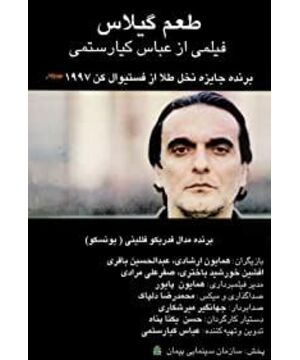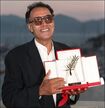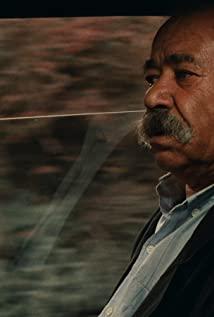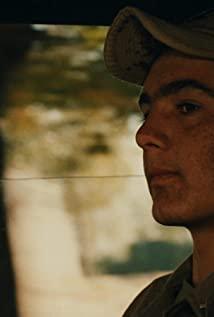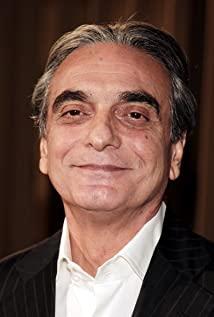The film's protagonist, Buddy, a gloomy middle-aged man, can no longer seem to find a reason to continue living, so naturally, he chose death and got off the train of life ahead of time. Although he made this choice, he is not a hasty person, which can be seen from his consideration of the events behind him. He thought that after death, the relatives would either collect and bury their relatives, which would cause more or less pain, or at least anxiety for them; None of these Mr. Buddy was willing, so he made an unusual arrangement for his own death: dig a hole under a cherry tree, swallow a lot of sleeping pills the night before, then lie down in the hole, and the second In the morning, let someone come to the pit and call him twice. If he can still answer, he will rescue himself; if he is silent, no matter if he slept too deeply or if he really died, bury him with 20 shovels of soil, and then bury him. This person can get the 200,000 rials (Iranian currency unit) that Mr. Badi left him. All the planning is very careful -- including how much shovel soil to use. Now Mr. Buddy just needs to find someone to help him with his plan, so he drives his car through the crowd. The movie starts here.
This is not the first time in Abbas's film that the protagonist is looking for his car in public. In "Life Continues", the protagonist also drives a car and asks passersby about the two children. He is worried that they will be killed in the earthquake. Are the two similar in form? The "Car Movie" is the opposite in theme. The protagonist of "Life Goes On" is looking for the hope of life, while the Mr. Buddy in "The Taste of Cherry" is looking for the hope of death. Why did he choose to die? The video doesn't say. As a film director, Kiarostami respects the free will and privacy of the protagonist: he did not enter the protagonist's apartment to shoot, did not try to find out why the protagonist planned to kill himself, and did not judge the motives of his actions. The circumstances gave him the right to choose death. He explained: "In the eyes of God and social norms, choosing to die is the only privilege a human being can have, because almost everything in our lives is predestined when we are born: our date and place of birth, our parents, our Our home, our nationality, our culture..." But people can't choose their own birth, and the lack of freedom in this initial choice is decisive. You can freely breathe the air, enjoy the sun, and have all the conveniences created by post-modern industrial civilization. From birth to death, during this long or short period of time, you can live "freely" under the permission of the system you are in, and choose friends, marriage, work, etc. according to your own wishes, but this can show that at birth Besides, are we free? the answer is negative. Decisive unfreedom removes the false mask of all this "freedom"--from the beginning we are slaves of life. The various "freedoms" we emphasize are nothing but self-consolation to relieve helplessness and cover up despair. The most deceiving of all is that we are free to choose death. --Such as Abbas' fictional story for us. Abbas takes this assumption to the extreme, that the protagonist Buddy is a man who died to die - there is no past, we don't know his birth, and everything that happened after him. A person without a past can only recognize his freedom - Abbas has no better choice. But even with such a person, he cannot freely choose to die, otherwise why would he have to go to great lengths to arrange his own funeral? So rather than looking for a helper and witness to his suicide, he needs a communicator - someone who evaluates his actions.
In this way, people could not help but doubt the motives of his death, and Abbas also emphasized these doubts implicitly or explicitly. In the first ten minutes of the film, Buddy drove around in a labor market. Many people who were eager to find a job approached him, but he refused one by one. It stands to reason that these people should be his first choice. They only care about wages and do not care about what to do. Buddy didn't look for them, so what did he look for? A soldier, a seminary student and a museum taxidermist. The soldier who was still a child was stunned by the idea of Buddy, who apparently thought Buddy was crazy and ran away in panic; next came the seminary, and if Buddy was really looking for a suicidal helper, his This choice was wrong. Islam forbids suicide, but he found a devout defender of the Koran to help him commit suicide. The result is predictable; the final taxidermist is more like a philosopher. Simple, but enough to save Buddy's heart from despair, listen to his words, every sentence touches people's hearts:
Are you desperate? Don't you want to see the golden sun at dawn again? Have you ever seen the moon? Don't you want to look at the stars again? Do you want to close your eyes? People in another world still want to see this world, but you want to go to another world! ... Wouldn't you like to drink some more spring water? Don't you want to wash your face with this water? ... there are summer fruits in summer, autumn fruits in autumn, and fruits in spring and winter. No mother can store so much fruit in the refrigerator for her children, and mothers do not do as much for their children as God does for His creatures. Do you want to deny everything? Do you want to give up everything? Do you want to give up the taste of cherries? Don't do this, I'm your friend, I beg you not to do this! ..." Facing this kind of spiritual communication, the melancholy of death on the protagonist's face was no longer so strong, and he began to pay attention to the beauty of the sunset. After he took his temperature carefully, put on a coat, and sat in a taxi -- pay attention, He had promised to put the money in his car to be taken away by the man who buried him, and at this time he took a taxi, if it is not a scam, then it is only possible that he has changed his mind! - to his own" Lying down in the grave", under the flash of lightning, Buddy's eyes flashed with crystal tears. After a long black screen, the director left the audience time to think, we have enough time to guess Buddy Di's choice. In fact, everything is very clear, no one is willing to give up the taste of cherries and the life as sweet as a cherry. This should be the choice of Buddy, and us, everyone!
We agree that as individuals, we have the freedom to choose death, and that's it, because it's a matter of very low operability. Death has been waiting for us somewhere since the moment we were passively born to exist in the world as a living being. Various survival experiences and personal histories interpret the meaning of death in a very special way, and people choose to avoid it rather than face it calmly. Even someone like Mr. Buddy, who can ignore his history and origins, cannot freely exercise the power to end his life. Abbas's intention is to show that the so-called "free" choice of death has only theoretical meaning. What a desperate conclusion! Abbas said that some people believe that the moment of free choice of death, life is under their control from then on, and eternal in an instant. The reality is disappointing..." We dimly see the specter of existentialism flashing in Abbas's words. Because of birth, we have the right to choose death, and precisely because of the experience after birth, we strive to give up this power. This paradox On the eternal despair. We can be pessimists, but we can't live without hope. With this idea, Abbas rescued us from this eternal despair with a cherry.
In fact, there are some very simple things around us. Things can penetrate the helplessness of life, such as this "cherry" by Abbas. The lightness of the cherry and the weight of life are connected by Abbas' poetic imagination, which makes people think infinitely. The strong humanistic care penetrates into the hearts of every audience through the sweetness and sweetness of this magical fruit. Abbas completed this imagination with the help of his unique lens language, video images and audio-visual elements.
Panoramic images shot with long lenses have always been Abbas’s preference. In a 4-minute long still shot, Buddy’s car is moving slowly on the circular winding road, and the old taxidermist is heard outside the painting. The sound seemed to come from the sky. The image of the mountain road keeps appearing in front of us again and again. Maybe life is so long and painful, but Abbas feels that we should not give up because of this. Even if one road is blocked, we can still have another choice. Before the end of the scene, the old man led Buddy to another road, Buddy said: "I don't know this road." The old man said: "But I know this road, it is longer, better, and more beautiful. I have been groping in this desert for 35 years." This wise and kind old man who has experienced the vicissitudes of life led Buddy to the road of new life. In this scene-sequence shot, where all the elements are in full view, we watch with relief as Buddy turns to a "longer and better" path--life goes on. When shooting these large panoramic pictures, Abbas paid great attention to the level of composition and the harmony of light and shadow, such as a large panoramic shot at the end of the film. Di, his face no longer has the breath of death, but a deep nostalgia for life. The whole picture is stable and delicate, like a surreal painting, reflecting the director's sensitivity as a painter and the temperament of a poet.
There are more than 400 shots in the whole film, only in the last dozen shots do we see the colorful flowers, the lush trees and grasses, and these natural colors were filtered by Abbas before this. Go, there is only a grayish yellow, this depressing and suffocating subjective color complements the gray state of mind of the protagonist's single-minded desire for death, which is amazing.
In the last few shots of the film, the director Abbas appeared incredible on the screen. The rough footage, shot with a hand-held camera, seems to be Abbas' autograph for his own film, while also reminding viewers, "Never forget that we are watching a film. Even in moments that seem very real..." --Another Abbasid cunning.
The charm of a good movie lies in its inexhaustible meaning and indescribable charm. For "The Taste of Cherry", we can only say: Abbas "cherry", the fragrance emanating from this dry and indifferent world is irresistible; Abbas's films make us redeemed in eternal despair.
Behind-the-scenes
"The Taste of Cherry" shows the wonderful process of discovering life when looking for death, and discusses the view of life and death in "the contradiction between restriction and freedom". With its profound philosophical thinking, it caused a sensation in the world film circle. The Palme d'Or at the Cannes International Film Festival. When the film is about to end, it is a fixed camera shot, facing the face of the protagonist lying in the tomb with mixed feelings for a long time. With the thunder and lightning, the faint tears of the protagonist flashed intermittently in the darkness, and the sound of pattering rain. It adjusts the silent picture of Wan Lai and creates a solemn sense of ceremony. Then, a long black picture appeared, which made people think: Will he be willing to give up his cherry-like life? The philosophical thinking that is easy to become boring and monotonous is condensed with beautiful cherries, which can be described as a unique style. Just when the audience fell into deep thinking, Abbas suddenly used the rough-grained documentary images to deconstruct all the images he had spent so much time creating: the camera and the director entered the painting, telling the audience that this was just filming. Opinions differ on this ending. This is undoubtedly Abbas's signature, full of domineering, fully embodies his arbitrary means of dominating the film. Some people couldn't bear the ending, and felt that Abbas was "destroying his movie by himself."
[Edit this paragraph] Film analysis
The vast majority of the entire film is spent in Mr. Buddy's car. Mr. Buddy was driving around the suburbs. Why is Mr. Buddy going around? Because he wants to ask for help. What does he need help with? He was going to kill himself, hoping someone would bury his body after he died.
The film shows the desolate and barren land through unpretentious and rough pictures. Yellow has become the main color of the film. The picture is full of boundless deserts, and only a few scattered books give signs of life. Iran is indeed a country with a relatively low level of development. The arid climate, the trauma of war, and the surrounding wars have all left a deep imprint on such a troubled country; in sharp contrast to its material backwardness, The noble quality of the Iranian people: The director excavated the excellent quality of the Iranian people, and then produced a film like this, so that this film not only interprets the national cultural characteristics, but also has world significance.
"The Taste of Cherry" subtly conveys the true meaning of life and Iranians' unique view of life with simple and simple images and simple and touching music. Mr. Baddie first invited a young soldier to get into the car, and then asked the soldier to bury his body after his death for a huge sum of money. Although the soldier was very short of money, he refused Mr. Buddy's request, saying that he had never buried a dead person. When Mr. Buddy was driving on the road, suddenly his car rushed out of the road and one of the wheels was hanging in the air. At this time, many people working on the hillside came over to help push the car onto the road. The old man pushing the cart, he is facing the camera with a simple smile on his face. What smile in the world could be more beautiful than a smile like this? The simple and warm folk customs of the Iranian people deeply moved me. Buddy later asked a man on duty for help, but he stuck to his job. Then Buddy asked a seminary student for help, and the student thought: God created life, how can he destroy a life? To kill oneself is also to kill. Then he asked for help from an old man who worked at the Natural History Museum. The old man told Buddy a lot. Through the old man's mouth, the meaning of the title was explained: cherries are sweet, and there are many other sweet cherries in the world. Don't commit suicide just because of the little things, life is beautiful and life should be cherished. But the old man finally agreed to Buddy's request.
The film expresses a spirit of optimism that is a huge inspiration for Iran and its people, who are struggling to make progress.
This film is a film full of problems. Why did Buddy commit suicide? The film does not explicitly explain. In one place, Buddy said: God created human beings, but when human beings cannot live, God does not mind the destruction of a human being. Still, that still doesn't provide a clear reason for unraveling the reasons for Buddy's suicide. At the end, it was night, and Buddy lay in the prepared pit, waiting to die, waiting to live... At this time, the screen was dark, and it lasted for a while, and the film ended. Is Buddy dead? Did the old man come to fulfill his promise? We don't know, it's another suspense. The film uses the artistic technique of leaving blank spaces, changing the closed and clear meaning into an open and free interpretation, giving the audience endless thinking space and greatly expanding the performance range of the film. Full of problems is not a mistake, but shows the director's superb artistic expression ability.
The director of the film is Abbas. Abbas was praised by the Western media as "the most important film director who appeared on the world stage in the 1990s". His creation has influenced the development of Iranian films as a whole. The Palme d'Or at the Cannes Film Festival.
Wonderful Dialogue
Soldier: Trouble? What trouble? I don't want to do that. It's too late...I want to go back. I don't want to get involved in something like this.
Mr. Barty sighed and turned to look at the pit. Then he sighed again, turned to the soldier, and shrugged.
Mr. Barty: You don't want to fill this hole with a shovel? Now, I really need you or I won't beg you... do you want me to beg you? do you want?
Soldier: Oh no, why are you begging me?
After a while, wind can be heard.
Mr. Barty: Why is that, is it "necessary"? What does it mean to "help" people? You don't have to be paid to "help" people, but I still give you money...I help you...don't you need money? Isn't that so?
Soldier: Is it? Two hundred thousand, is that not enough?
Soldier: That's not what I mean...I don't want to do this for you...not about money.
Mr. Barty turned and glanced at the pit, then turned to the soldier.
Mr. Barty: Can't you just fill the hole with a shovel?
Soldier: No, I can't...but I can't fill people with soil, and I can't put soil on people's heads. How can you throw dirt on people?
Soldier: Yes.
Mr. Barty: If you understand, get out of the car and come take a look... When you come back here tomorrow morning at 6 am... your barracks is over there isn't it? It only takes 20 minutes to get here from the barracks...you call me twice: "Mr. Barty!" If I answer, you grab my hand and pull me out of it. You get that money. If I don't answer you...you come down. You get off! Come down, come here and see! Allah makes me need you, but you don't want to help me! don't you want to help me? Picking you up will not bury the living! Now, people are buried here...dozens of people. Dozens of people have been buried as we speak. Have you never seen a gravedigger?
Close-up to the right of Mr. Barty as he looks at the road with tears in his eyes.
Seminary student: Well, I understand you. Suicide is not a good thing though, because according to the Sunnah . Suicidal behavior, the belief that one should not commit suicide. ...the human body is given by God. People should not torture their own bodies. I understand you, but suicide by any
measure... Mr. Barty: You're right... But, I told you... I don't need preaching. If I wanted to hear about teaching...I would go to someone who had completed my studies and had more experience to teach me. I just ask you to do me a favor with your hands.
Seminary: My hands are for the execution of God's justice. And what you're trying to do...I don't feel it's justice.
Mr. Barty: I know that suicide is a grave sin. ...But living unhappily is also a sin. When a man lives unhappily, he brings misery to others. Isn't that a sin? Is it not a sin to cause suffering to others? To bring pain to family...to bring pain to friends...to bring pain to myself...isn't that a sin? It is not a sin for me to cause you pain, is it a sin for me to kill myself?
Seminary: You are right, it is indeed a sin to inflict pain on one's family and friends.
Mr. Barty: I think God is gracious and so great that he cannot bear to see his creatures suffer. God is so gracious that he cannot force man to live. That's why he gave man this possibility. Have you never considered the meaning of life?
View more about Taste of Cherry reviews


